Highlighting powerful partnerships in Tanzania
In our advocacy, we talk to Congress about the U.S. role in the global fight against poverty. As we discuss spending numbers and use policy jargon, it can be easy to forget just what those details really represent: they’re investments supporting the transformational work of local leaders around the world.
This August, six congressional staff and I traveled to Tanzania in eastern Africa, so congressional staff who are setting U.S. foreign policy could understand the impact of those decisions firsthand. In partnership with the Elizabeth Glaser Pediatric AIDS Foundation (EGPAF), we had traveled from halfway around the globe to visit schools, hospitals, clinics, and other public programs, and learn about the work happening locally with U.S. support.
Across Tanzania, teachers, doctors, health workers, and community leaders are working day in and day out for more equitable access to health, education, and a road out of poverty for individuals and communities. And U.S. government funding plays an important role in bolstering their work: programs and partnerships such as USAID, The Global Fund to Fight AIDS, Tuberculosis and Malaria, PEPFAR, and the Global Partnership for Education have had a powerful impact in Tanzania.
Here are just a few of our stops, where congressional staff got to understand how local leaders are making a difference with critical backing from U.S. funding.
Mlongo Project
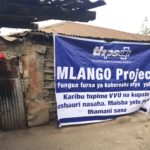 We visited a harm reduction center called the Mlongo Project, where the staff work with the local population to ensure that they have the ability to get tested for HIV/AIDS, and can get counseling around addiction issues. It is a health platform for folks who are habitual drug users, or don’t feel necessarily as safe going into a hospital with threat of arrests. The project is funded with Global Fund dollars, through an organization called Amref.
We visited a harm reduction center called the Mlongo Project, where the staff work with the local population to ensure that they have the ability to get tested for HIV/AIDS, and can get counseling around addiction issues. It is a health platform for folks who are habitual drug users, or don’t feel necessarily as safe going into a hospital with threat of arrests. The project is funded with Global Fund dollars, through an organization called Amref.
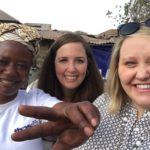
We met one of the local peer educators of the project, and she told us how she had been tested, screened, and treated for her HIV. Now, as a trained peer educator, she goes out into the community to bring people into the community-based harm reduction program. As part of the holistic support from the program, she was also supported to start her own entrepreneurial program on the side, is now able to support her family, and her kids are back in school.
Kibongoto National TB Hospital
We traveled to the premiere tuberculosis hospital for people with drug-resistant strains of TB, the Kibongoto National TB Hospital. Previously, patients had to travel long distances to reach the hospital. They stayed there alone, separated from their loved ones. To address this, Kibongoto had set up a powerful new treatment pattern of bringing care from the hospital out into the communities. This system allows patients to remain in their homes, surrounded by the support of their friends and family.
Mirerani
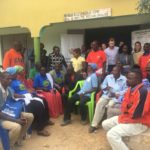 Tanzanite, a rare blue and violet gemstone, is mined only in Tanzania. Miners are known for having much higher rates of TB than the general population – it’s thought that the polluted air in the mines lacerates their lungs, leaving them more susceptible to TB infection.
Tanzanite, a rare blue and violet gemstone, is mined only in Tanzania. Miners are known for having much higher rates of TB than the general population – it’s thought that the polluted air in the mines lacerates their lungs, leaving them more susceptible to TB infection.
We visited a community outpost near the tanzanite mines in Mirerani dedicated to educating tanzanite miners about TB. The outpost is supported by EGPAF, and partners with Kibongoto National TB Hospital to bring health support to the miners. They ensure miners can get the right treatment and be part of a community support group.
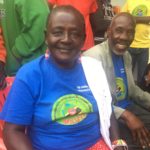
We met a peer educator who goes down to the mines to find miners and other community members who show symptoms of TB. She brings them into community groups to make sure they are getting and completing treatment. She had previously tested positive for tuberculosis, and been on treatment that had saved her life – now she is passionate about supporting her local community and stopping TB!
Hai District Hospital
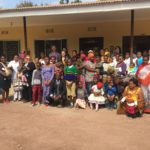 At Hai District Hospital, nestled at the base of Mount Kilimanjaro, we met around 40 mothers with their babies. Though all of the mothers had tested positive for HIV, all the babies had been born HIV-free. The hospital was doing remarkable work building community support systems that ensured babies were immunized, nourished, and healthy.
At Hai District Hospital, nestled at the base of Mount Kilimanjaro, we met around 40 mothers with their babies. Though all of the mothers had tested positive for HIV, all the babies had been born HIV-free. The hospital was doing remarkable work building community support systems that ensured babies were immunized, nourished, and healthy.
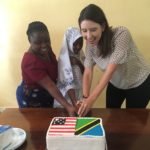 During our visit, we were presented with a mysterious gift wrapped in a cloud of cellophane. It was a huge cake, decorated with the American and Tanzanian flags, representing the two countries’ partnership in ending HIV/AIDS in babies and children. We sang together, celebrating the power of partnership to ensure that all babies are born HIV-free.
During our visit, we were presented with a mysterious gift wrapped in a cloud of cellophane. It was a huge cake, decorated with the American and Tanzanian flags, representing the two countries’ partnership in ending HIV/AIDS in babies and children. We sang together, celebrating the power of partnership to ensure that all babies are born HIV-free.
Girls education center
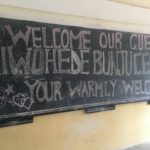 Under the current President, Tanzania has new legal limitations around girls being able to attend school after they’re pregnant or have had a baby. Young mothers are not allowed back in the public school system. On our last day, we went to a girls education center in Dar es Salaam providing inclusive education. The nonprofit that runs the center is supporting girls after pregnancy to ensure that they are getting a full education.
Under the current President, Tanzania has new legal limitations around girls being able to attend school after they’re pregnant or have had a baby. Young mothers are not allowed back in the public school system. On our last day, we went to a girls education center in Dar es Salaam providing inclusive education. The nonprofit that runs the center is supporting girls after pregnancy to ensure that they are getting a full education.
We heard from the kids themselves about their experiences. One girl stood up and declared that after pregnancy she’s come back to be one of the star students. She said proudly that she’s the second chair in her class, ranked number two out of everyone.
Women in the lead
I was really excited about how many women were leading the health workforce in Tanzania. Everywhere you went, it seemed like a woman was a head of a hospital, or a lead administrator. Seeing all these women leading was amazing.
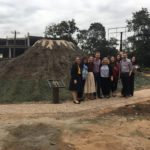 The congressional staff felt the trip was incredibly valuable, educating them on the real impact of U.S. foreign aid in Tanzania. The trip highlighted solid partnerships – we were honored to meet the ambassador, foreign service staff, a lot of local nonprofits, and so many Tanzanians fighting for quality health care. Seeing how all of them are working together around Tanzania’s future was really exciting.
The congressional staff felt the trip was incredibly valuable, educating them on the real impact of U.S. foreign aid in Tanzania. The trip highlighted solid partnerships – we were honored to meet the ambassador, foreign service staff, a lot of local nonprofits, and so many Tanzanians fighting for quality health care. Seeing how all of them are working together around Tanzania’s future was really exciting.